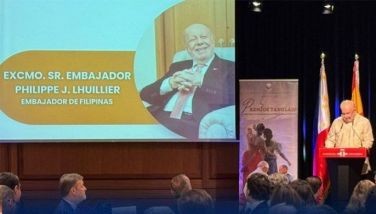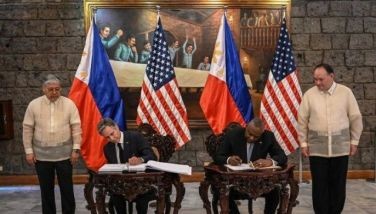These Germans want to become Pinoys
November 21, 2006 | 12:00am
While throngs of Filipinos go abroad and give up their citizenship for greener pastures, some foreigners would rather become Filipino citizens and be proud of it.
The resolutions on the applications for Philippine citizenship of two Germans — Fr. Ulriuch Schlecht and Michael G.J. Gleissner — were unanimously approved by the Senate yesterday.
Voting 20-0, the Senate approved on third and final reading the two resolutions that originated from the House of Representatives, which recommended the granting of citizenship to Schlecht and Gleissner.
Gleissner, a media entrepreneur and businessman, is chairman of the Bigfoot Group of Companies.
In 2002 he founded Bigfoot Asia Pacific Foundation Inc., a non-profit organization that provides opportunities to the less fortunate to gain information technology skills in the country.
Schlecht, a retired priest who wants to stay in the Philippines for good, spent 40 years of his life as a missionary for the Society of the Divine Word (SVD). He is 67.
"Dili ako babalik. I will stay here for good kasi I love it here. All the people I know are here. I don’t know anybody there (in Germany) anymore. I spent my life too long here and I like it here," Schlecht remarked in mixed Cebuano and English. He also knows how to speak Filipino.
In an interview with The STAR before he was granted citizenship, Schlecht added he doesn’t mind the politics here and just wants to be of service to Filipinos.
"Never mind (the politics). But I like it here," Schlecht said.
Schlecht was born on Sept. 15, 1939 in Arnsberg, Germany to Gustav Schlecht and Klara Henne.
"We are eight brothers and sisters. All except me live in Germany. My youngest sister Irmgard, spends much time in the Philippines, at least several weeks each year," Schlecht said. His father died in 1971 while his mother is now 90.
"I arrived in the Philippines on August 13, 1962 for the purpose of studying Theology here and work as a priest of the Catholic Church and a member of the Society of the Divine Word (SVD)," Schlecht said.
In his appeal to lawmakers in seeking Filipino citizenship, Schlecht expressed his earnest desire to be a Filipino.
"I have lived and worked in the Philippines since 1962 with one interruption. I have every intention to stay here (until) I die. And since I have come to love the country and its people, I would greatly desire to be given Filipino citizenship," Schlecht said.
The priest, now retired, also wrote President Arroyo on May 31, 2002.
"There is no real necessity for me to apply for Filipino citizenship. I have been happy with my German ancestry and I have never in my life come into any conflict with German laws," he wrote the President in his one page "letter of intent."
Schlecht added: "So why would I apply for Filipino citizenship? I feel that after 40 years of living and studying and working here among the people, after having experienced many ups and downs, much joy and sorrow, and after much good and also a good amount of evil, I have come to love the people, and I have decided to stay here for good."
Upon his arrival in 1962, Schlecht lived and studied in the Christ the King Seminary in Quezon City, and later at the Divine Word Seminary in Tagaytay City.
After his ordination as a priest at the SVD in Tagaytay City, he was assigned to work at the University of San Carlos in Cebu City for 20 years from 1966 to 1986. It was during this time that he fell in love with the Philippines, he said.
Schlecht taught Religion and worked as university chaplain and later as director of the San Carlos Retreat House.
From 1986 to 1991, Schlecht was reassigned to Germany to help in one of SVD’s colleges there. He returned to the country, particularly in Trento, Agusan del Sur where he spent his later years on pastoral work.
It was in 1996 that the German priest opened a new parish in Sta. Maria, Trento, a village located 17 kilometers from the town in the mountains where a number of Manobos thrived.
"I built the parish from scratch, and was able to construct all the things needed for the work in a regular parish... I was also able to rebuild and enlarge all 18 chapels of the parish so that the people in the mountain sitios would have a better place for worship and assembly," Schlecht recalled.
In appreciation of Schlecht’s effort, the Trento municipal council passed a resolution describing the German priest as somebody who does not confine his work to spiritual needs but "also... to the needs of the people in every parish where he is assigned."
The Trento town resolution accompanied Schlecht’s application for citizenship which he submitted to the Senate.
Schlecht was accompanied by Agusan del Sur Rep. Rodolfo Plaza and his wife, Shirley, and a few friends at the Senate last Wednesday when Sen. Juan Ponce Enrile, chairman of the Senate committee on justice and human rights, sponsored the citizenship application of the two Germans.
The granting of Filipino citizenship of a foreigner is a difficult process since any application has to muster the approval of the House of Representatives and the Senate.
Gleissner meanwhile has become so in love with the country that he has learned by heart some famous Filipino songs. A brief manuscript on Gleissner’s biography presented to the Senate showed his love for the country and its people.
Gleissner is chairman of Bigfoot Entertainment, a fully integrated entertainment company specializing in production, production services, talent management and film financing.
Mr. Gleissner’s love for Filipino culture has him setting his sights on promoting Filipino music abroad.
He has singled out "Anak" by Freddie Aguilar and "Bakit Ngayon Ka Lang" by Ogie Alcasid, which are among his favorite songs.
Gleissner had also acquired the rights to remake the song, "Bakit," and made a $150,000-worth music video of the song.
This was prompted by an incident at an international hotel here when Gleissner requested the band to play, "Bakit."
When told by the hotel manager the band does not do Filipino songs as an in-house policy, Gleissner blurted out: "But that’s a beautiful Filipino song, you should do it."
Gleissner first arrived the country on Sept. 11, 2001.
Back in Germany, Gleissner owns an IT company he founded at the age of 18 with two partners.
He has since extended his business operations to the US and Africa.
In 1998, Gleissner left his hometown and moved to the US, which became his primary residence. He later became vice president of Amazon.com, which he acquired in 1998.
What struck Gleissner when he got here was the Filipinos’ love for music. The manuscript submitted to the Senate said Gleissner fell in love with the people, the culture and the country.
Gleissner saw the warmth of the Filipinos, their ability to laugh and enjoy life despite the difficulties in life, and the closely-knit families.
What he liked the most is the Filipinos respect for the elderly, the family ties that bind the young to the old, with the children taking care of their parents, and parents prioritizing their children’s needs over their own.
As he envisioned Cebu to become the Hollywood in Asia, Gleissner had invested millions of dollars to set up the Bigfoot Global Solutions with headquarters in Cebu. He also invested $20-million in setting up the International Academy of Film and Television (IAFT)/Bigfoot Entertainment, a fully integrated entertainment company specializing in production, professional training, production services and film financing.
"He may not be a native Filipino but he has become a Filipino at heart, loving the country despite its imperfections, calling it home," the manuscript said.
"Wherever he goes, he always finds that he misses the Philippines. The Philippines and the Filipinos have captured a portion of his heart, and just like many overseas Filipinos, Mr. Gleissner wherever he goes he will always come back to the country that he has come to love," it said.
Gleissner was living a cosmopolitan life in Germany before moving to the United States where he also became vice-president of Amazon.com.
His foundation in the Philippines focuses on providing IT education, especially at public schools located in underprivileged areas in the country.
For its first year alone, Bigfoot Asia Pacific Foundation built 22 Bigfoot Learning Centers in remote public elementary and high schools in Cebu and Negros Oriental.
Gleissner’s other business ventures included Cleverlearn Inc., the leading provider of English learning solutions and Movielearn Inc, which provides the fine and interactive way to learn English through movies developed by young Filipino talents.
Besides tapping the Filipinos’ unrealized potentials, Gleissner also wanted to help the most vulnerable and disadvantaged sectors of society, especially the children.
Gleissner’s Bigfoot Foundation has established two-30 seat teacher training laboratories in Cebu City, four 15-seat teacher-training centers in Bongo, Bahaman, Alco and Dumajug to serve teachers and schools in remote areas in the province.
The foundation had also established computer labs and training centers, and turned over 20,000 free accounts of its CleverCourse product to the Department of Education for the use of elementary and high school students in Cebu City and Cebu province.
CleverCourse features the largest library of English lessons online. It offers general English course, as well as industry-specific business English courses in marketing, manufacturing, business travel, finance, customer service, information technology, human resources and business presentations.
The Bigfoot Foundation also gives scholarships to poor but deserving college students, particularly seminarians and the children of ex-convicts. Gleissner believes in helping the less fortunate to attain self-sufficiency.
The website of Bigfoot Entertainment describes Gleissner as a noted underwater photographer and music video director. Gleissner began his professional career in the technology industry.
After his service as vice president at Amazon.com, Gleissner started a New York-based hedge fund, generating exceptional returns by short-selling overpriced, internet companies.
After the dot-com bubble, Gleissner made headlines as he took major stakes in devalued but viable dot-com assets when the market bottomed and exited these investments with exceptional returns.
In 2000, Gleissner turned his attention to email pioneer Bigfoot.com, acquiring and utilizing the brand for what turned into a Hong Kong and Singapore-based conglomerate, with businesses in communications, business process outsourcing, education and real estate.
An entertainment division, Bigfoot Entertainment, was then added with investments exceeding $20 million.
The investments include ventures such as a state-of-the-art production facility in Cebu, a film school, the International Academy of Film and Television, and Bigfoot Partners.
It has produced and financed diverse films such as "3 Needles" (Lucy Liu, Chloe Sevigny and Stockard Channing), "East Broadway" (Margaret Cho), "Shanghai Kiss" (Kelly Hu) and "The Curiosity of Chance" (Tad Hilgenbrinck from American Pie Presents: Band Camp).
Among projects in development by Bigfoot Entertainment are the adventure travel television series, "Nautical Angels" and feature films "See Dick Run" and "Cockfight," shooting later this year. Bigfoot also acquired the master franchise of Fashion TV in Singapore and the Philippines.
The resolutions on the applications for Philippine citizenship of two Germans — Fr. Ulriuch Schlecht and Michael G.J. Gleissner — were unanimously approved by the Senate yesterday.
Voting 20-0, the Senate approved on third and final reading the two resolutions that originated from the House of Representatives, which recommended the granting of citizenship to Schlecht and Gleissner.
Gleissner, a media entrepreneur and businessman, is chairman of the Bigfoot Group of Companies.
In 2002 he founded Bigfoot Asia Pacific Foundation Inc., a non-profit organization that provides opportunities to the less fortunate to gain information technology skills in the country.
Schlecht, a retired priest who wants to stay in the Philippines for good, spent 40 years of his life as a missionary for the Society of the Divine Word (SVD). He is 67.
"Dili ako babalik. I will stay here for good kasi I love it here. All the people I know are here. I don’t know anybody there (in Germany) anymore. I spent my life too long here and I like it here," Schlecht remarked in mixed Cebuano and English. He also knows how to speak Filipino.
In an interview with The STAR before he was granted citizenship, Schlecht added he doesn’t mind the politics here and just wants to be of service to Filipinos.
"Never mind (the politics). But I like it here," Schlecht said.
Schlecht was born on Sept. 15, 1939 in Arnsberg, Germany to Gustav Schlecht and Klara Henne.
"We are eight brothers and sisters. All except me live in Germany. My youngest sister Irmgard, spends much time in the Philippines, at least several weeks each year," Schlecht said. His father died in 1971 while his mother is now 90.
"I arrived in the Philippines on August 13, 1962 for the purpose of studying Theology here and work as a priest of the Catholic Church and a member of the Society of the Divine Word (SVD)," Schlecht said.
"I have lived and worked in the Philippines since 1962 with one interruption. I have every intention to stay here (until) I die. And since I have come to love the country and its people, I would greatly desire to be given Filipino citizenship," Schlecht said.
The priest, now retired, also wrote President Arroyo on May 31, 2002.
"There is no real necessity for me to apply for Filipino citizenship. I have been happy with my German ancestry and I have never in my life come into any conflict with German laws," he wrote the President in his one page "letter of intent."
Schlecht added: "So why would I apply for Filipino citizenship? I feel that after 40 years of living and studying and working here among the people, after having experienced many ups and downs, much joy and sorrow, and after much good and also a good amount of evil, I have come to love the people, and I have decided to stay here for good."
Upon his arrival in 1962, Schlecht lived and studied in the Christ the King Seminary in Quezon City, and later at the Divine Word Seminary in Tagaytay City.
After his ordination as a priest at the SVD in Tagaytay City, he was assigned to work at the University of San Carlos in Cebu City for 20 years from 1966 to 1986. It was during this time that he fell in love with the Philippines, he said.
Schlecht taught Religion and worked as university chaplain and later as director of the San Carlos Retreat House.
From 1986 to 1991, Schlecht was reassigned to Germany to help in one of SVD’s colleges there. He returned to the country, particularly in Trento, Agusan del Sur where he spent his later years on pastoral work.
It was in 1996 that the German priest opened a new parish in Sta. Maria, Trento, a village located 17 kilometers from the town in the mountains where a number of Manobos thrived.
"I built the parish from scratch, and was able to construct all the things needed for the work in a regular parish... I was also able to rebuild and enlarge all 18 chapels of the parish so that the people in the mountain sitios would have a better place for worship and assembly," Schlecht recalled.
In appreciation of Schlecht’s effort, the Trento municipal council passed a resolution describing the German priest as somebody who does not confine his work to spiritual needs but "also... to the needs of the people in every parish where he is assigned."
The Trento town resolution accompanied Schlecht’s application for citizenship which he submitted to the Senate.
Schlecht was accompanied by Agusan del Sur Rep. Rodolfo Plaza and his wife, Shirley, and a few friends at the Senate last Wednesday when Sen. Juan Ponce Enrile, chairman of the Senate committee on justice and human rights, sponsored the citizenship application of the two Germans.
The granting of Filipino citizenship of a foreigner is a difficult process since any application has to muster the approval of the House of Representatives and the Senate.
Gleissner is chairman of Bigfoot Entertainment, a fully integrated entertainment company specializing in production, production services, talent management and film financing.
Mr. Gleissner’s love for Filipino culture has him setting his sights on promoting Filipino music abroad.
He has singled out "Anak" by Freddie Aguilar and "Bakit Ngayon Ka Lang" by Ogie Alcasid, which are among his favorite songs.
Gleissner had also acquired the rights to remake the song, "Bakit," and made a $150,000-worth music video of the song.
This was prompted by an incident at an international hotel here when Gleissner requested the band to play, "Bakit."
When told by the hotel manager the band does not do Filipino songs as an in-house policy, Gleissner blurted out: "But that’s a beautiful Filipino song, you should do it."
Gleissner first arrived the country on Sept. 11, 2001.
Back in Germany, Gleissner owns an IT company he founded at the age of 18 with two partners.
He has since extended his business operations to the US and Africa.
In 1998, Gleissner left his hometown and moved to the US, which became his primary residence. He later became vice president of Amazon.com, which he acquired in 1998.
What struck Gleissner when he got here was the Filipinos’ love for music. The manuscript submitted to the Senate said Gleissner fell in love with the people, the culture and the country.
Gleissner saw the warmth of the Filipinos, their ability to laugh and enjoy life despite the difficulties in life, and the closely-knit families.
What he liked the most is the Filipinos respect for the elderly, the family ties that bind the young to the old, with the children taking care of their parents, and parents prioritizing their children’s needs over their own.
As he envisioned Cebu to become the Hollywood in Asia, Gleissner had invested millions of dollars to set up the Bigfoot Global Solutions with headquarters in Cebu. He also invested $20-million in setting up the International Academy of Film and Television (IAFT)/Bigfoot Entertainment, a fully integrated entertainment company specializing in production, professional training, production services and film financing.
"He may not be a native Filipino but he has become a Filipino at heart, loving the country despite its imperfections, calling it home," the manuscript said.
"Wherever he goes, he always finds that he misses the Philippines. The Philippines and the Filipinos have captured a portion of his heart, and just like many overseas Filipinos, Mr. Gleissner wherever he goes he will always come back to the country that he has come to love," it said.
His foundation in the Philippines focuses on providing IT education, especially at public schools located in underprivileged areas in the country.
For its first year alone, Bigfoot Asia Pacific Foundation built 22 Bigfoot Learning Centers in remote public elementary and high schools in Cebu and Negros Oriental.
Gleissner’s other business ventures included Cleverlearn Inc., the leading provider of English learning solutions and Movielearn Inc, which provides the fine and interactive way to learn English through movies developed by young Filipino talents.
Besides tapping the Filipinos’ unrealized potentials, Gleissner also wanted to help the most vulnerable and disadvantaged sectors of society, especially the children.
Gleissner’s Bigfoot Foundation has established two-30 seat teacher training laboratories in Cebu City, four 15-seat teacher-training centers in Bongo, Bahaman, Alco and Dumajug to serve teachers and schools in remote areas in the province.
The foundation had also established computer labs and training centers, and turned over 20,000 free accounts of its CleverCourse product to the Department of Education for the use of elementary and high school students in Cebu City and Cebu province.
CleverCourse features the largest library of English lessons online. It offers general English course, as well as industry-specific business English courses in marketing, manufacturing, business travel, finance, customer service, information technology, human resources and business presentations.
The Bigfoot Foundation also gives scholarships to poor but deserving college students, particularly seminarians and the children of ex-convicts. Gleissner believes in helping the less fortunate to attain self-sufficiency.
The website of Bigfoot Entertainment describes Gleissner as a noted underwater photographer and music video director. Gleissner began his professional career in the technology industry.
After his service as vice president at Amazon.com, Gleissner started a New York-based hedge fund, generating exceptional returns by short-selling overpriced, internet companies.
After the dot-com bubble, Gleissner made headlines as he took major stakes in devalued but viable dot-com assets when the market bottomed and exited these investments with exceptional returns.
In 2000, Gleissner turned his attention to email pioneer Bigfoot.com, acquiring and utilizing the brand for what turned into a Hong Kong and Singapore-based conglomerate, with businesses in communications, business process outsourcing, education and real estate.
An entertainment division, Bigfoot Entertainment, was then added with investments exceeding $20 million.
The investments include ventures such as a state-of-the-art production facility in Cebu, a film school, the International Academy of Film and Television, and Bigfoot Partners.
It has produced and financed diverse films such as "3 Needles" (Lucy Liu, Chloe Sevigny and Stockard Channing), "East Broadway" (Margaret Cho), "Shanghai Kiss" (Kelly Hu) and "The Curiosity of Chance" (Tad Hilgenbrinck from American Pie Presents: Band Camp).
Among projects in development by Bigfoot Entertainment are the adventure travel television series, "Nautical Angels" and feature films "See Dick Run" and "Cockfight," shooting later this year. Bigfoot also acquired the master franchise of Fashion TV in Singapore and the Philippines.
BrandSpace Articles
<
>
- Latest
- Trending
Trending
Latest
Trending
Latest
Recommended































